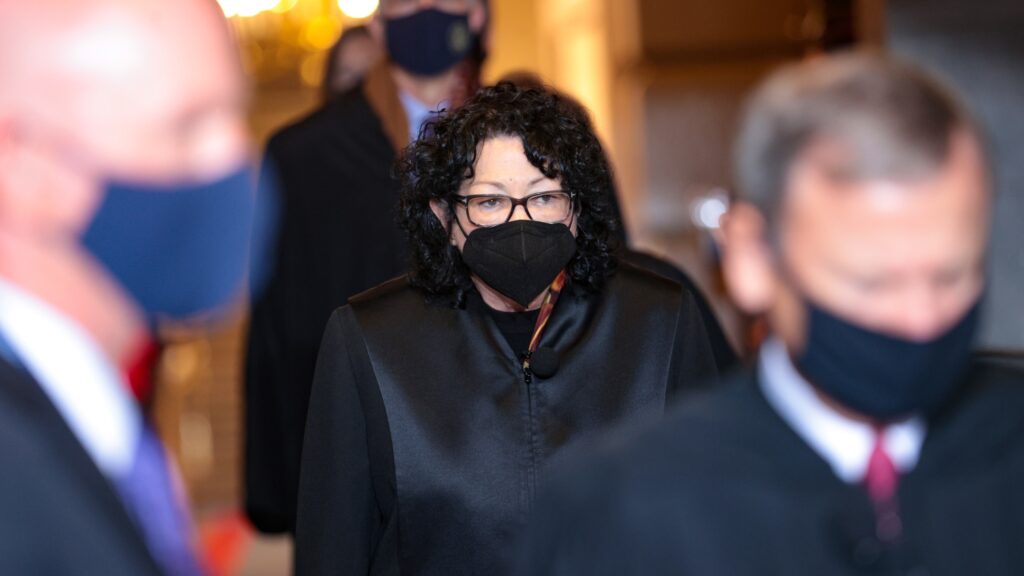Supreme Court justice Sonia Sotomayor increasingly finds herself in a frustrating position, being a liberal on an increasingly conservative US Supreme Court. When the Supreme Court declined a few weeks ago to strike down a pro-life law enacted by the state of Texas, the so-called Texas Heartbeat Law, she issued a rancorous and pointed dissent, writing that the law was “clearly unconstitutional” and her conservative colleagues “have opted to bury their heads in the sand.” Such heated rhetoric is not terribly unusual for justices in a losing position. Conservative icon Antonin Scalia, who battled a liberal Supreme Court majority for years, was famous for his pointed dissents in important cases.
At the time, I dismissed Sotomayor’s opinion without much hesitation as I almost never agree with her on matters of ideology or philosophy. But comments she made recently about this same Texas abortion case caught my attention. Surprisingly I found myself in wholehearted agreement with what she said, although not in the way she intended.
Speaking to law school students at an event sponsored by the American Bar Association just a few days before the current US Supreme Court term commenced, Justice Sotomayor said this of the Texas abortion case: “You know, I can’t change Texas’s law. But you can, and everyone else who may or may not like it can go out there and be lobbying forces in changing laws that you don’t like.”
I could not agree with her more. Sotomayor has unwittingly just articulated the proper position of Supreme Court jurists and underscored the fundamental flaw in the Supreme Court’s approach to abortion jurisprudence for much of the last fifty years. Judges are not legislators. They are not to legislate from the bench. Their job is to interpret the law and the constitution as it was written, not as they would like it to be. They don’t get to write laws.
When the US Supreme Court created a federal “right” to abortion in Roe v Wade in 1973, they acted as legislators, not jurists. They invented – legislated from the bench – a constitutional right that did not exist. It did not exist then, and it does not exist now. The regulation of abortion is simply not found in the US constitution. It is a matter left to the states to decide.
Likely in the next few days, the US Supreme Court will determine how the Texas heartbeat law should be considered by the courts, but the Texas law is not where the issue of abortion will be decided. That will be in the Dobbs v Jackson Women’s Health Organization case, which ifamnews.com has covered extensively (See for example here, here and here.)
The Dobbs case is a full, frontal challenge to the US Supreme Court’s abortion jurisprudence, first created (legislated) in Roe, and then recrafted (amended) in Planned Parenthood v Casey. In Dobbs, the state of Mississippi asks the Supreme Court to correct its grave error in Roe and Casey and to rule that, in fact, there is no constitutional right to abortion. Instead, it is up to Mississippi legislators and elected officials to determine how to regulate abortion in Mississippi, just as it is up to elected officials in Texas to decide abortion law in their state, and elected officials in California and New York to decide abortion law in their respective states. California and New York will no doubt regulate abortion much differently than will Texas and Mississippi, but that is the beauty of the federalist system created by our nation’s founders.
Briefing in the Dobbs case is already complete. Oral argument is scheduled for December 1, 2021. A ruling is expected sometime in 2022, very likely when the term comes to a conclusion in June.
When they reach their decision in the Dobbs case, every justice on the US Supreme Court, including Justice Sotomayor herself, should keep in mind the wisdom of the advice that Sotomayor shared with those law school students a few weeks back. Justices can’t write laws. They are not legislators. They are not to legislate from the bench. It is up to the American people to, as Justice Sotomayor so wisely observed, “go out there and be lobbying forces in changing laws.”
Let us hope that she and her colleagues have the courage to take her words to heart.
